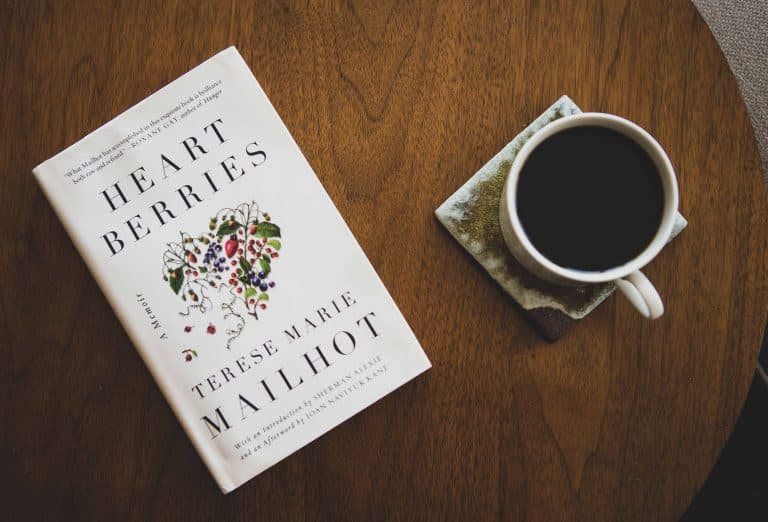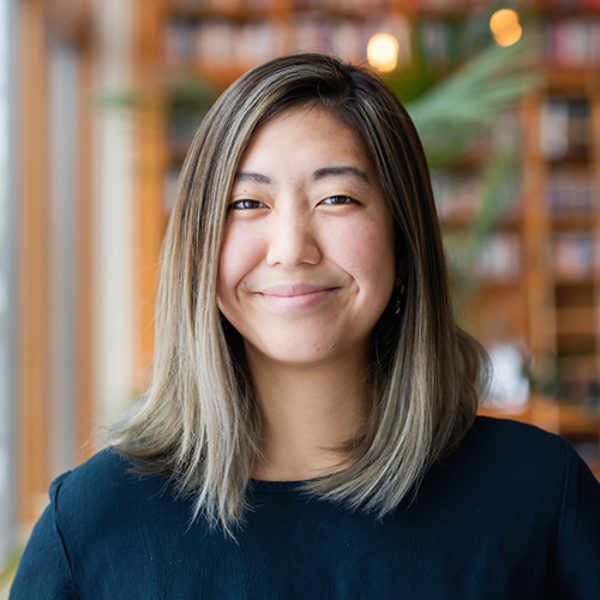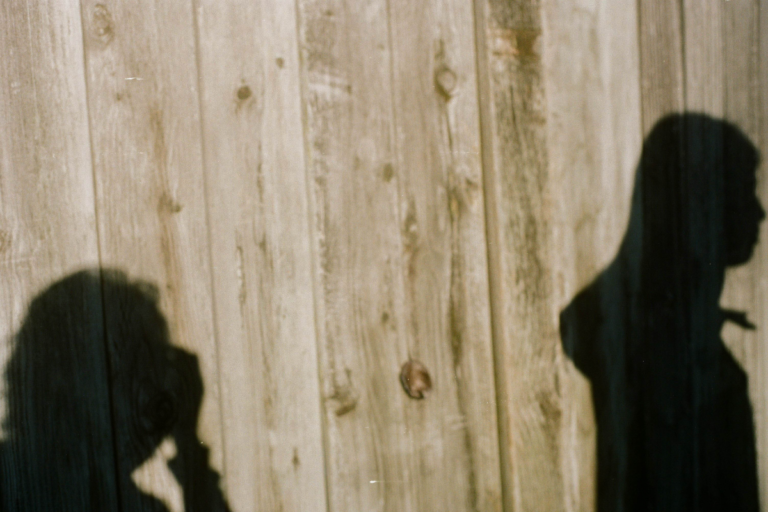
Image by Profit Idowu/On Being.
What We Inherit and What We Pass On: A Conversation with Terese Marie Mailhot
I’ve always been fascinated by family history as a lens for self-understanding: What is everything I have inherited, and how did that conspire to place me where I am? This questioning and searching is often intergenerational in nature, at times requiring us to ask questions of people who are no longer around — or of memories that only we carry.
This idea of searching for inheritance is at the core of Heart Berries, Terese Marie Mailhot’s debut memoir. A graduate of the Institute of American Indian Arts’ Low Residency MFA Program, Mailhot is part of a wave of Indigenous writers rising to prominence in recent years. Her perspective as an Indigenous writer is something she discusses often; in the afterword of her memoir, she says, “The writers before me seemed to do the work of looking at being Indigenous so we could look through it.”
Heart Berries is anchored in the time after Mailhot is hospitalized with a diagnosis of post-traumatic stress disorder and bipolar II disorder, an experience that catalyzes her to reflect on the kinds of heartbreaks — familial, romantic, and historical — that have built her. In its very premise, Heart Berries captures a liminal and critical moment in Mailhot’s life. When we first meet her, she is a litany of losses: Both her mother and her estranged father have passed away. She has left the Seabird Island First Nation, where she grew up. She is divorced from her ex-husband, Vito, and has just lost custody of her first son, Isadore. “The ugly truth of that truth,” she writes of the custody battle, “is that I gave birth to my second son as I was losing my first.”
From this great dearth, Mailhot begins to find her way toward new questions, ones that press her to place her own life — her own pain — in a relational context: She whittles her pain into what she calls a “memorial,” reflecting deeply on the role that her parents have played in shaping her trauma, as well as how that might be passed on to her sons. I talked to her about this process and the role that intergenerational learning played in helping her to understand her story.
You’ve said before that “the writers before me seemed to do the work of looking at being Indigenous so we could look through it.” Could you elaborate?
It’s kind of like the contrivance of establishing the Native experience — writing essays and writing short stories that illustrate what an Indigenous community looks like and what blood quantum issues are — I feel like those essays and stories have been written, and I felt like, at this juncture in my writing life, I didn’t feel the need to explain myself as a Native person. I felt like I could jump into that experience without any of the setup, like a TV sitcom or something. I didn’t like the contrivance of having to explain why there was systemic issues or inequalities. I was not interested in explaining it.
You begin Heart Berries with the line, “My story was maltreated.” When I hear you explain the idea of looking through being Indigenous, the book seems like a response to that. And as you mention, your mother was a poet. Have you perceived any differences or similarities in how your mother’s work and identity was received through her work, and then, how your work is now being received?
The interesting thing is, my mother didn’t feel the need to assert that she wanted to be read and looked at in a certain way. I don’t know why she assumed that they would look at her work and her being, and that she wouldn’t need to challenge their ideas. My book starts with the assertion that my story was maltreated because I’m telling the reader how to read my story, but she never prefaced her work with any of that. And in some ways, her voice stood by itself, and the way the world treated it was on them. But for me, I wanted to guide the reader in. So I think we just had different ways of being artists. She was before her time, and I think I’m the type of writer who is kind of challenging or obstinate about the rules and how I want to be read.
Can you say a little bit more about that?
She wrote poetry, and she did it for the sake of writing. She kept it in a box, and when people solicited her work, they often took it. For example, my aunt asked her for work, and she was a published author; she has nine or ten books out. And she took my mother’s work from the ’60s and ’70s, and she never did anything with it. And my mother just kept writing. The onus was on the people who asked to do the right thing.
And with me, I knew, if I was gonna write a book, I was gonna write it and publish it with a press that was gonna treat the story well and not manipulate the text to be something it wasn’t. They weren’t gonna ask me to write 100 pages more to make it a fuller thing. I wrote that beginning chapter as an assertion — I guess, because, seeing the way my mother’s story was maltreated and the way that my own had been maltreated, I guess I felt it necessary.
At what age did you become familiar with your mother’s work as a poet?
Probably age five, or even before I could read. She was a single mom, so when she was at her typewriter, working, we would be either underneath her desk, playing, or we would be on her bed, or we would be on the other side of the door, and she would just smoke menthols and write. And the pages — we were always able to just pick up what she was writing and read it. She didn’t really censor herself or ask us not to, and we were all interested in what she was doing. So we were all familiar with her work and exactly what it was trying to do — she was a radical activist, so a lot of her work was about her experiences as a Native woman trying to make the community better.
That process of coming to an understanding of your mother — which I feel like is an important part of Heart Berries — must be so different when you can refer to her work.
It’s a little disheartening to have a parent who cares about something besides you. Because when you’re a kid, you think, “Who cares if you want to write all night? Who cares? I want to watch a movie with you,” or something. And I think a lot of it, it’s generational. I find myself explaining to my son why I have to write or why I have to go to work, and “Oh, this is on top of my job.” I understand that: I’m a teacher and I’m a writer, and I have to compartmentalize them; but my son can’t, because he’s: “I would like time with you now. You can write later.” And he just doesn’t understand.
And I was really just so moved by your portrayal of motherhood, and particularly, your own experience with it, of feeling like you were needed so deeply by another human being, and how healing that can be.
That’s the other thing — it does help me, because when I go and I write, I know it matters more, because I only have a finite amount of time, because then, I have to parent.
Your book has been characterized as a coming-of-age, but it defies traditional criteria for that category. It’s clear that this isn’t your first reckoning with yourself. How was the experience of writing the book different from all your previous “comings-of-age”? And what do you feel like you’ve grown into because of this book?
It’s more of a coming-into-my-30s story, because, really, it did heal me. I’m not absolutely healed, but writing the book made it possible for me to speak casually about abuse to other survivors and to also advocate for victims in my own community. The book made it possible for me to have this language of experience, where I’m able to empower others. So in that way, it changed my life. Now that I’ve illustrated what has happened to me, I can really breathe, take a full breath. I felt haunted by my father and by my mother, and in order to put them to rest, I had to put it down on the page.
Would you characterize that as humanizing your parents? What is the language that you’ve used to make sense of that?
I think it’s “memorial.” I’m so reluctant to use that word, “humanize,” because so many people use it with black, Indigenous, and people of color, that our job is to “humanize” Indigenous people, or our job is to “humanize” this experience. But that’s — we’re already human, right?
I think everyone knew my mother was human; not everybody knew how important she was to me. They thought we had issues, and that was the end of the story. Like, “Oh, mother issues,” and “Oh, your mother was a narcissist” — that’s what I heard when I was in the mental hospital.
And I just — I would rather have written my story as something else, and I think this is what I’ve done. I’ve memorialized them in a way that is more true to my experience with them, which is even different than what my brothers experienced.
What was the culture around mental health and mental illness for you growing up, and how do you think that influenced how you wrote about your own mental illness in the book?
In the ’80s, it was all about “I’m OK, you’re OK.” Self-help was new. There was all of this regressive therapy — “Let’s travel into your deepest memory.” I resisted that for much of my life because I thought it was hokey. You can’t retrieve a memory, and you can’t blame everything on your parents.
It ended up going back to that idea of “Well, let me look at my past,” because I had, in my 20s, chose a cognitive behavioral therapy approach, where it was like, “Oh, you’re feeling sad today. What are ten things you can do to feel better?” And none of those things — they were all external things. They weren’t internal, “Oh, I could talk about my mother for an hour, and that would actually make me feel better, because it would be a purging.” They don’t want that in cognitive behavioral therapy — they want you to move forward in your life, not backwards. So, for me, it was like, “No, this is very distinct. My experience is intergenerational, and looking back is a huge part of it,” especially considering my grandparents and the fact that this misery seems to follow my family; and colonization is a big part of that. And I had to talk about that.
What are your thoughts on the language around intergenerational trauma?
Anything too familiar and accessible and approachable, I’m gonna be suspicious of. When I think about it — there’s one way to say it that makes it too simplistic, and there’s another way to say it that is an actual interrogation of the self and how it relates to your history. And I think trauma does follow you. I think my children have inherited my trauma, not just by being in proximity to me but by being related to me. I think there is something in their bodies that makes them more artistic. I think there’s something that makes them — they like to interrogate people and ideas. And I think that wasn’t something — with Isadore, he’s had so little exposure to me, but he’s a photographer, and he’s interested in ideas, and he’s a very challenging person. And I think that that has something to do with my blood.
This interview has been edited and condensed.


Share your reflection